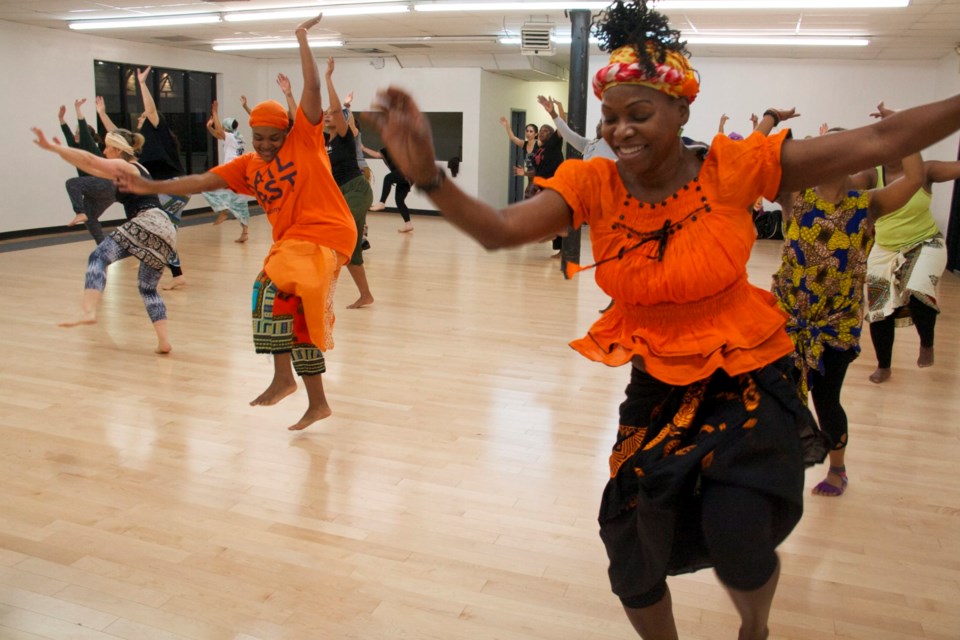The Power of African Diaspora Dance

Community. Healing. Love.
When you dance, something beautiful happens to your mind, body and spirit. It somehow has the power to make things better, release some pain, bring joy to the spirit and see your neighbor as your brother or sister. It has the power to mend lost connections. It has the power to soothe wounds. It has the power to transcend.
Experts, dance professionals and lovers of the art say that through dance, healing can take place within the mind, body, spirit and community.
Daniela Gilbert, an avid dancer originally from California, started to dance after college, seeking a new way to exercise and create community. She found dance spaces that not only provided the movement, but also family.
"The community I found was composed of mostly women, intergenerational and locals," she says. "I had a very stressful job and dance was a way to express myself and build connections and relationships with people non-verbally."
Daniela is speaking of the electric feelings and communication she discovered through dancing in synchronicity with others. A recent video from BBC explains that dancing with others creates a bond unlike any other. For Daniela, dance, particularly African Diasporic dance at Cumbe, has helped create connections and relationships in ways she otherwise would not have formed.
"For someone who is interested in understanding, in context, in people and culture and connection and spirituality, Afro Diasporic dance hits those marks pretty hard and deep," Daniela believes.
Professional dancer Tony Yemeya Domenech has been teaching Afro Cuban dance for many years. His practice includes Orisha dance, a type of dance that evokes the power and spirit of the Orisha, a group of deities within Santeria, an Afro Cuban religion with roots in the Yoruba people of Nigeria and Benin. He says that it's part of his mission to demystify Orisha dance and give students an opportunity to experience the power and elevation dance has to offer.
"When it comes to dance, especially the genre I teach, the first part, above all, is very spiritual and the energy can be a little intense. When we are dancing, we can get a little emotional," Tony explains. "It's like when people are singing or listening to gospel and they feel the Holy Spirit, dancing can sometimes get very emotional and hit the soul in a similar way. That's what it does for me."
As an instructor at Cumbe, he's witnessed the power of Orisha dance among his students. Years ago he had an 81-year-old student. She attended the class regularly but didn't express any particular feelings about the class. It wasn't until the student showcase that year when Tony learned how dance was changing this woman's life.
"Her son approached me afterwards and said, 'I hear your name all the time. My mother was really sick. But she's gone to the doctor and said whatever she is doing she should keep doing it because she is getting better.'
The dance classes at Cumbe kept her alive," Tony says, remembering the joy he felt after hearing the good news.

Diane Duggan, a board certified licensed dance therapist and psychologist, is a believer in the power of transformation and healing through dance. In her career as a therapist, she's worked with severely emotionally damaged youth. It's been through spiritual and traditional dance that she's witnessed some of the greatest healing.
"The Orisha are part of our collective humanity," Diane says. " There are often parts (of our humanity), in Western European culture, which is my heritage, we're not going to deal with unless covertly."
But here are traditions that you can feel self love. For example Oshun caress her arms in a way you can see this expression of beauty. That's transformative. It's part of us. So many of us lack self love. I think it's useful to take and feel that self love and to have an experience and have a communal experience of self love."
Among a group of students she was teaching strong warrior dances of Ogun and sensual beauty dances of Oshun, she found that these typically aggressive and emotionally challenged teens were finding an outlet and a space to express their anger, freedom and creativity and feel validated.
"I remember this beautiful student of mine, she was dancing an Oshun dance where she caresses her wrist in a way like bangles or bracelets. As she did this, she looked so beautiful and lost in the moment and then I remembered that under the white sleeve of her leotard were scars where she had cut herself because of the pain in her life. I thought, how beautiful is this moment where she can express self love."
Do you have a transformational experience from dance? Share it with us at [email protected].
Experience healing, community and love through dance. Cumbe: Center for African and Diaspora Dance is a safe space for a holistic dance experience.




